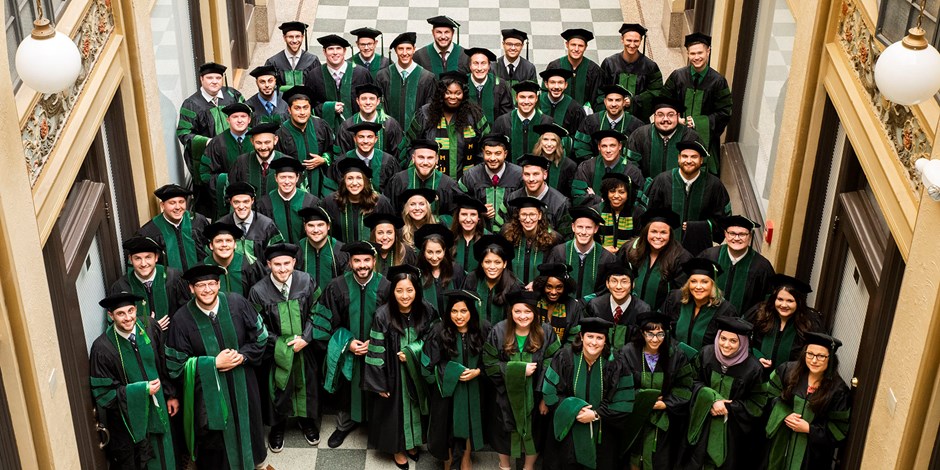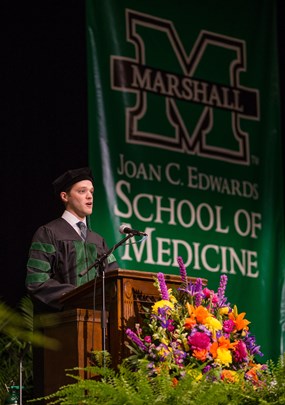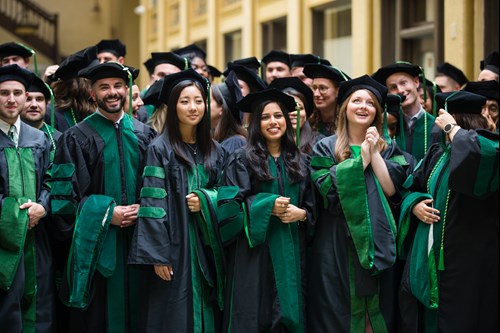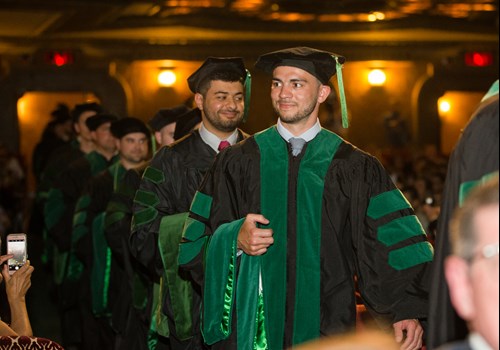
Tonight, We are Doctors
BLOG / By Dr. Karl G. Shaver
This is a modified version of the speech Dr. Shaver delivered to his class during the school's 39th Annual Graduation & Investiture ceremony on May 10, 2019.
 Tonight, we celebrate a milestone--a long-awaited moment since we received our first white coats almost four years ago. For tonight, we become doctors.
Tonight, we celebrate a milestone--a long-awaited moment since we received our first white coats almost four years ago. For tonight, we become doctors.
I am charged to describe what, at times, has been indescribable and to chronicle our class’s extraordinary journey through medical school. I am confident in saying that the Class of 2019 is among the best to pass through the School of Medicine. Our classmates have come into the school with diverse and impressive backgrounds. We have a law school graduate, a mother of three children, and a West Point graduate who served our nation as a Captain in the U.S. Army. Our classmates have been college athletes, entrepreneurs, and even self-proclaimed catfishing experts. Though our individual paths to Marshall are unique, we have shared a similar story over the last four years.
Perhaps most important among our similarities are those of you sitting in the theatre tonight. You see, none of us would be here without support from our families and friends. Graduation is a testament to the many sacrifices you made to help us reach our goal, and your pride in our achievement is matched by our sincerest gratitude. And so, we thank you...for your encouragement when things got tough. For your understanding when we were busy and overwhelmed. And, for the knowledge that we have had somebody in our corner, rooting for us to succeed. And, we’re sorry. We’re sorry we didn’t call more. We’re sorry that dinner conversations turned into horrifying accounts of what we saw in the hospital. And we’re sorry that things are only going to get worse in residency.
Everyone in the audience knows one of my classmates. You recognize the amount of work that your loved one has put into these last four years. And you’re proud of them, impressed by what they have achieved and excited to see what great things lie ahead. I can assure you that each of my classmates shares these qualities that you admire in your loved one, and I am grateful that I have gone through this journey with 62 of the most talented people I have had the privilege to know and call my friends. I am constantly humbled by the qualities my classmates have that will lead them to successful careers as physicians and that will benefit patients across the country for years to come.
Also among you in the audience today are faculty members and staff of the Joan C. Edwards School of Medicine. We as a class owe a great deal to our Institution. When we received our phone calls from Cindy Warren letting us know that we had been accepted into medical school, little did we know how being a part of the Marshall family would impact our journey. Our institution saw potential in each of us and invested its resources to shape us into the doctors we will become. So thank you, Dean Shapiro, Dr. (Bobby) Miller, the faculty, Amy (Smith) and Laura (Christopher) for believing in us and investing yourselves in our education. Among our incredible faculty is Dr. Jay Lakhani, who our class selected to serve as our Honorary Hooder tonight. Dr. Lakhani has served as a mentor to our class, beginning this journey with us four years ago when he spoke at our white coat ceremony and continuing alongside us until today. We thank him for being an example of the qualities we want to embody as doctors and agreeing to serve this important role tonight.
We also recognize the significance of becoming alumni of the Joan C. Edwards School of Medicine. We join a group of talented and well-respected physicians across the country and will forever be ambassadors of Marshall. While our paths may take us in many different ways, we will never forget all that we have received from our Institution and the obligation we share to help it to continue its mission. I am happy to announce that our class will be leaving the school a $15,000 endowment to help further the quality medical education we received here.
And now to the journey. How can I describe the last four years? The bar was set high, and we were forced to clear it, reset it higher and clear it again, pushing us beyond any limitations we had imposed upon ourselves and proving that with dedication and resilience, our potential may, in fact, be limitless. We celebrated collective successes and endured collective hardships. Tears were shed and four years later, we emerged with receding hairlines, bags under our eyes and a collection of remarkable experiences and memories that will change our lives forever.
 I didn’t quite know how to chronicle the last four years, so as any medical student would, I decided to turn to some quantitative data.
I didn’t quite know how to chronicle the last four years, so as any medical student would, I decided to turn to some quantitative data.
Our first two years were spent largely in the classroom studying biochemistry, anatomy, physiology, pathology, microbiology and pharmacology. We had 650 hours of lecture on 23,000 slides of new information--which, thanks to one of my classmates, I know equates to a stack of notecards roughly 6 feet high (in case you were curious). We dissected and identified 785 anatomical structures in the cadaver lab, performed 15 clinical exams with actors as patients, and, at the end of the first two years, sat for our first 8-hour National Board Exam.
And then came year three. We entered the wards confident in our medical knowledge and skills and quickly realized just how wrong we were! But as our class always has, we persevered. By the end of our third year, we rotated through 7 core specialties, saw over 400 patients, participated in 60 different procedures, and endured a week of nights, 24-hour shifts, 4:30 a.m. alarms, 7 standardized tests, and our second and third National Board Exams.
We learned that mental illness is physical illness on our psychiatry rotation, and that all of the neuroanatomy we learned in second year and had since forgotten was actually important for our weeks in neurology. We rotated through pediatrics and now have the expertise to get into online arguments with anybody who thinks vaccines are bad, and we found out that it’s somehow possible to spend 10 hours walking less than a mile on Internal Medicine inpatient rounds. On our surgery rotation, we held retractors. Then, on OB/GYN, we learned that the miracle of childbirth is actually pretty gruesome--Happy Mother’s Day, Mom, and I’m sorry I’m a twin. On family medicine, we learned that it really is possible for some physicians to know a little bit of everything and be the stereotypical small-town doctor that for many of us served as our inspirations to apply to medical school in the first place.
So, after experiencing the breadth of medicine during our third year, we diverged as fourth-year medical students and began preparing for our chosen specialties. Thousands of dollars spent driving to numerous interviews later, we arrived at Match Day--the day medical students across the country find out where they will continue their training as resident physicians--and our class walked away with an incredible Match. One of our classmates went through the Military Match and has committed to serving our nation in the U.S. Army, and we would like to say thank you to Matt Saab for his commitment to serve, and to Captain Matt Bruner for his previous time serving our nation in the U.S. Army.
As a Class, we matched into 15 different specialties including dermatology, neurosurgery, obstetrics and gynecology, psychiatry and emergency medicine. One-third of our class matched into primary care specialties like internal medicine, family medicine and pediatrics and 14 members of our class will be continuing their training here at Marshall.
 But, our story is more than that. Our class also completed 6,429 hours of community service. There were 15 engagements and weddings and 4 babies on the way. There were two medical mission trips to Honduras and 42 medical outreaches to the homeless. 22 med school Mondays and countless Southern Belles, weekend trips and memories made with friends. You see, our journey has been more than the number of exams we took or the pages of notes we read. Life did not stop for medical school, and nor will it stop when we become doctors. And nor should it. We should be more than walking versions of WebMD. Our humanity is what will make us better doctors who are able to treat patients as the people they are and not the pathologies they’re afflicted with. I hope we never lose that. I hope we remember what motivated us to dedicate our lives to becoming doctors, to help others, to be a source of comfort to those who feel afraid and vulnerable and to make a lasting impact in somebody’s life. I hope we never cease to be humbled in our careers. Our patients will share their stories with us, telling us secrets and sharing their fears. They’ll put their trust in us, and I hope we will recognize the magnitude of that relationship and rise to meet our obligation to them.
But, our story is more than that. Our class also completed 6,429 hours of community service. There were 15 engagements and weddings and 4 babies on the way. There were two medical mission trips to Honduras and 42 medical outreaches to the homeless. 22 med school Mondays and countless Southern Belles, weekend trips and memories made with friends. You see, our journey has been more than the number of exams we took or the pages of notes we read. Life did not stop for medical school, and nor will it stop when we become doctors. And nor should it. We should be more than walking versions of WebMD. Our humanity is what will make us better doctors who are able to treat patients as the people they are and not the pathologies they’re afflicted with. I hope we never lose that. I hope we remember what motivated us to dedicate our lives to becoming doctors, to help others, to be a source of comfort to those who feel afraid and vulnerable and to make a lasting impact in somebody’s life. I hope we never cease to be humbled in our careers. Our patients will share their stories with us, telling us secrets and sharing their fears. They’ll put their trust in us, and I hope we will recognize the magnitude of that relationship and rise to meet our obligation to them.
Our Class has been through a lot together. We showed that we are hardworking and motivated, persistent and ambitious. We took unprecedented steps in taking an active role in our medical education, and I believe we are leaving our Institution better off because of it. We should be proud of what we have achieved and hopeful for what is to come. I am grateful to have gone through this journey with you all by my side. I am humbled that you entrusted me to be your president these last four years. I could not have served you in this capacity alone, and I’d like to thank the other Class Officers- Emily Wright, Fadi Hanna and Erin Fankhanel for their invaluable help.
As we close this chapter of our lives and move on to the next, I offer one final wish. That your journeys be satisfyingly challenging and that you not spend your days looking only toward the finish line, enjoying instead the path you’re on and the people you’re with as you continue to work toward your goals. So to the Class of 2019, congratulations guys, we did it together. Tonight, we are doctors.
Karl G. Shaver, MD, is president of the class of 2019.
Date Posted: Friday, May 10, 2019




